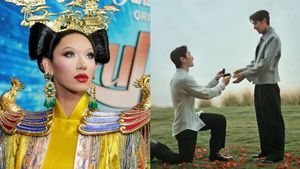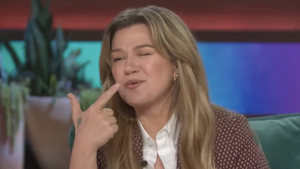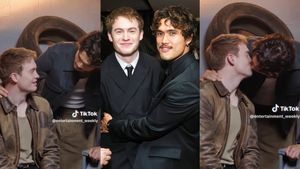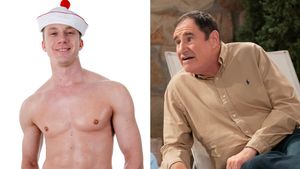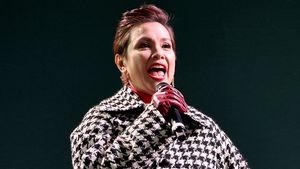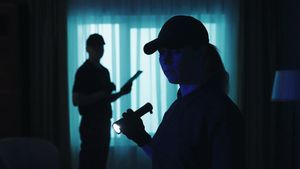 I was enjoying a short moment of respite at the end of a long workday, riding the elevator down 18 stories, when the lift lurched to a stop and three men and a lot of testosterone stomped in. Wearing the heterosexual-office-worker uniform -- semifitted beige khakis and billowy blue button-downs -- and grins on their faces like the happiest of happy hours awaited, these guys gushed about winning teams and successful presentations. Their goofy joy was slightly infectious; a half-smile appeared on my face and my eyes turned down.
I was enjoying a short moment of respite at the end of a long workday, riding the elevator down 18 stories, when the lift lurched to a stop and three men and a lot of testosterone stomped in. Wearing the heterosexual-office-worker uniform -- semifitted beige khakis and billowy blue button-downs -- and grins on their faces like the happiest of happy hours awaited, these guys gushed about winning teams and successful presentations. Their goofy joy was slightly infectious; a half-smile appeared on my face and my eyes turned down.
A dozen seconds later we reached surface level and the doors opened. Even though Phi Kappa Hetero was closer to the doors, no one took a step. Oh, OK, they're letting me out first, I figured. Turning into Hatsumomo from Memoirs of a Geisha, I smiled, looked down, muttered "thank you," and strode out. Well, that's always nice, I thought, walking into the L.A. sunshine. Right?
Interested in my too-pleased reaction to the elevator adventure, I tried to understand what exactly just took place. Their hesitation to leave first didn't feel like normal politeness, but part of a deeply ingrained societal rule. My tight Top Shop pants and polo must have given away my gayness (or the hair or the sunglasses or the man-bag) and these straight guys were being ... gentlemanly? By waiting patiently for me, they gave me the respect that honorable men bestow upon women. That's a good thing! But, wait! I'm not a woman. Was that whole interaction a slam?
Other gay men in my office confirmed to me they've on occasion been allowed to exit the elevator first by the many straight guys who occupy our tower (there's a sports agency a few floors down, so you can imagine). Is this the new paradigm in a gay-friendly city like Los Angeles? Straight men treat gay men not like equals, but like the more rarefied sex? It's better than derision. Of course, that's assuming it's not derision.
It's hard to say what straight urban men of 2013 think of their gay brothers. Obviously, relations between the two groups can't be gleaned from this one experience, but it felt telling. These three guys, who we'll assume are hetero (I didn't have time to pull a Kinsey test out during our ride together), were polite and cordial. If they assumed I was gay, which I assume, there was an absence of comments or snickers or even awkwardness. Maybe if I gave them a straight guy nod, instead of turning coquettish, they would have exited the elevator first. Maybe it's on me for turning the energy around and underlining the differences between us.
The chasm between straight and gay sometimes feels stark and, at least for me, not all the reasons for that are legitimate. After developing numerous crushes on my male friends in high school, I gravitated to a clique filled mostly with straight girls. Like most impressionable teens, I took my cues from my circle. When at a party with a lot of guys, I'd watch these normally hilarious, often catty, and frequently brazen girls go mute and passive. Their thinking, to paraphrase them, was that desirable girls aren't the loud ones cracking jokes, they're the silent, smiling ones wearing bodysuits and tasteful chokers. When I'm in an elevator or a subway car or a DMV line with a bunch of straight guys, that learned behavior can rear its big-haired head. Not surprisingly, most hetero guys react accordingly, which, if they're not homophobic assholes, is to treat me like they would an outnumbered, somewhat vulnerable woman.
It's not just the straight guys who people like me allow to emasculate us, but also straight women. It's lovely to not be excluded from baby showers and bachelorette parties, but it's odd when gay guys are the only men there. I understand women desiring safe spaces, where they don't have to worry about men leering at them or fret too much over how they look (similar to a gay man letting his hair down at a lesbian bar), but being lumped as "one of the girls" doesn't feel quite right. Being called a "girl" isn't offensive -- that's only an insult if you're a misogynist -- but surprise, surprise, I'm not one. I'm a gay man and proud of it. Can we all agree it's outdated to not allow someone to attend a party because of what's between their legs and what they like to do with it? If a straight guy can't be trusted at a bachelorette party, then maybe he's a douche who shouldn't be invited to the wedding.
Unlike straight men, we gay guys have very few role models to take cues from. Especially for us who came of age before Neil Patrick Harris, Zachary Quinto, Robbie Rogers, and Jason Collins were out. When I first tried to imagine myself as a gay man, I had society's gender roles in my head; I believed I had to abide by them. If I was to date a man, what would I be? I'd have to be like ... a woman, I guess? While I'm no Marlboro Man, there are masculine qualities of me that I initially tamped down (my penchant for belching, a love for trains, etc.). As I settled into my late 20s, I grew more comfortable with the idea of two men being with one another. Soon, I grew a beard, traveled alone, starting writing about trains; things you associate with guys. I didn't do these things to appear less gay, but because they simply felt like me (and the beard creates the illusion of a more defined jawline).
Clearly, I'm not yet completely at ease around straight male strangers, especially when they travel in packs. The flip side is probably true for many of them as well. A bunch of excited gays would probably make even the most fair-minded straight guy occasionally nervous. Of course, the smart straights know we're not going to rip off our shirts and launch ourselves at them, but we're creatures they're still growing accustomed to. Our humor, our lingo, our references are very specific. So I'll cut straight men and the patriarchal society they benefit from a little slack when they place me in the same category as their wives and mothers. I may be a man, but I still crave a little chivalry.
NEAL BROVERMAN is a columnist for The Advocate and the editor in chief of Out Traveler. Follow him on Twitter @nbroverman.
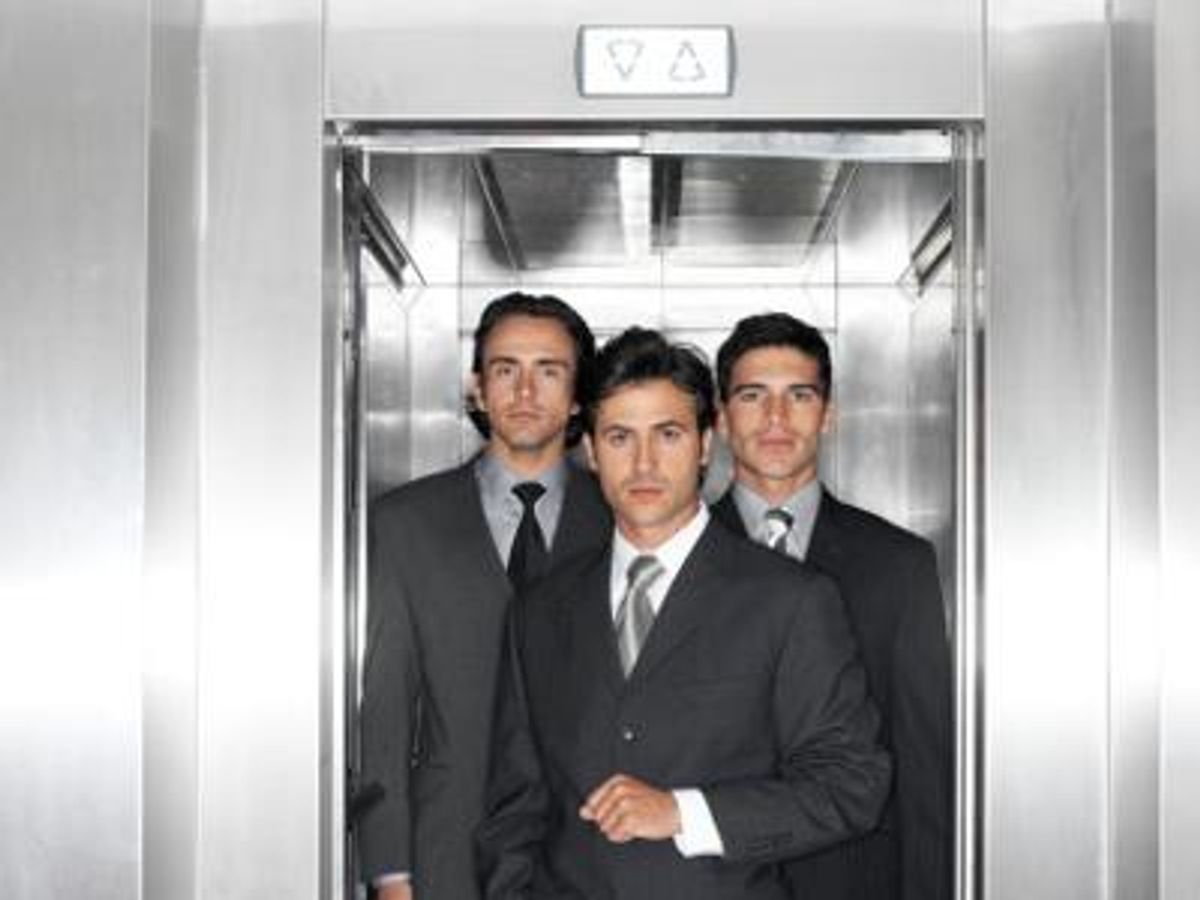


 I was enjoying a short moment of respite at the end of a long workday, riding the elevator down 18 stories, when the lift lurched to a stop and three men and a lot of testosterone stomped in. Wearing the heterosexual-office-worker uniform -- semifitted beige khakis and billowy blue button-downs -- and grins on their faces like the happiest of happy hours awaited, these guys gushed about winning teams and successful presentations. Their goofy joy was slightly infectious; a half-smile appeared on my face and my eyes turned down.
I was enjoying a short moment of respite at the end of a long workday, riding the elevator down 18 stories, when the lift lurched to a stop and three men and a lot of testosterone stomped in. Wearing the heterosexual-office-worker uniform -- semifitted beige khakis and billowy blue button-downs -- and grins on their faces like the happiest of happy hours awaited, these guys gushed about winning teams and successful presentations. Their goofy joy was slightly infectious; a half-smile appeared on my face and my eyes turned down.




